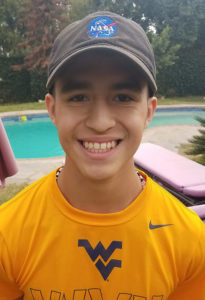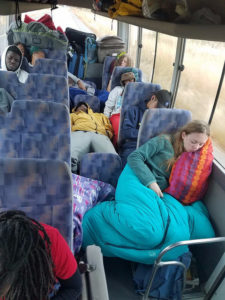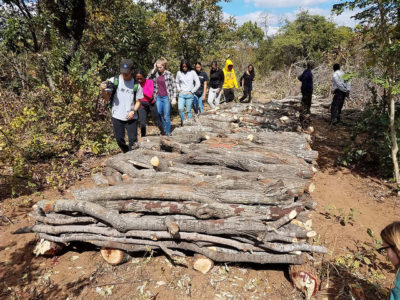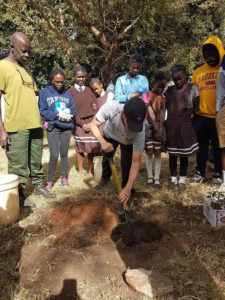 Thursday, July 5 – It was our last morning in Lusaka, Zambia before hitting the road to Livingstone at 7:00 am in what was supposed to be a 7-hour ride, but turned out to be a 9-hour ride. Most of us slept for a good part of the drive. I slept about an hour at the beginning but later decided to stay awake because the landscape started becoming interesting and different. It was starting to become what I had thought Zambia – or rather, what I thought Africa – would look like. I kind of felt like I was going to be able to spot a lion or an elephant. What I saw on the road trip was different than being in Lusaka because there were many open areas of land rather than the compounds in Lusaka with many houses and businesses. So, we were in the bus pretty much the whole day. When we got to Livingstone, we met a good friend we called Uncle Benj. At his house, we picked up the tents that we were going to be using at our camp site. Then, we headed to our camp site to set up all the tents as quickly as possible before nighttime came, so we wouldn’t have to do it the dark. Fortunately we were successful as they were not the easiest to set up. Lastly, we went to a restaurant called Olgas and I ordered a vegetarian pizza, I can never go wrong with that. After a full tummy, we settled in our tents for the first time and called it a night.
Thursday, July 5 – It was our last morning in Lusaka, Zambia before hitting the road to Livingstone at 7:00 am in what was supposed to be a 7-hour ride, but turned out to be a 9-hour ride. Most of us slept for a good part of the drive. I slept about an hour at the beginning but later decided to stay awake because the landscape started becoming interesting and different. It was starting to become what I had thought Zambia – or rather, what I thought Africa – would look like. I kind of felt like I was going to be able to spot a lion or an elephant. What I saw on the road trip was different than being in Lusaka because there were many open areas of land rather than the compounds in Lusaka with many houses and businesses. So, we were in the bus pretty much the whole day. When we got to Livingstone, we met a good friend we called Uncle Benj. At his house, we picked up the tents that we were going to be using at our camp site. Then, we headed to our camp site to set up all the tents as quickly as possible before nighttime came, so we wouldn’t have to do it the dark. Fortunately we were successful as they were not the easiest to set up. Lastly, we went to a restaurant called Olgas and I ordered a vegetarian pizza, I can never go wrong with that. After a full tummy, we settled in our tents for the first time and called it a night.
 Friday, July 6 – The first morning in Livingstone was a weird one. Waking up with a lot of noise from birds and cars passing with velocity and then seeing that it had rained while we were sleeping. Our tents were still somewhat wet in the early morning, which is odd because it is winter here in Zambia, which is the dry season. So, rain is pretty uncommon. At around 10:00 am, we met up with Uncle Benj for an exciting day of learning all about charcoal. Uncle Benj is an environmentalist and the Director of Trees for Green Pop, an organization based in South Africa that focuses on protecting and restoring biodiversity in the environment in Zambia as well as some other countries in Africa. In the morning, Uncle Benj took us to find a charcoal kiln, many of which are scattered all over a protected forest. A kiln is a “Hot Stove” built on the ground that is used to burn trees until they turn into charcoal. The reason why we had to search for it was because building a charcoal kiln is illegal in certain areas, especially if the citizens don’t have a permit. This is because the process of the kiln affects the environment negatively, contributing to climate change and pollution. After they collect charcoal from the kilns, they sell it in town to the public. Even though the citizens know it is illegal, they build kilns and sell charcoal anyway because for them it’s the only way to feed their families and their only source of income. Uncle Benj thought of a great solution that would help the environment instead of putting it in danger, which was to create other opportunities for the citizens to earn an income while not destroying the environment. These opportunities could include planting trees, fishing, or being a farmer.
Friday, July 6 – The first morning in Livingstone was a weird one. Waking up with a lot of noise from birds and cars passing with velocity and then seeing that it had rained while we were sleeping. Our tents were still somewhat wet in the early morning, which is odd because it is winter here in Zambia, which is the dry season. So, rain is pretty uncommon. At around 10:00 am, we met up with Uncle Benj for an exciting day of learning all about charcoal. Uncle Benj is an environmentalist and the Director of Trees for Green Pop, an organization based in South Africa that focuses on protecting and restoring biodiversity in the environment in Zambia as well as some other countries in Africa. In the morning, Uncle Benj took us to find a charcoal kiln, many of which are scattered all over a protected forest. A kiln is a “Hot Stove” built on the ground that is used to burn trees until they turn into charcoal. The reason why we had to search for it was because building a charcoal kiln is illegal in certain areas, especially if the citizens don’t have a permit. This is because the process of the kiln affects the environment negatively, contributing to climate change and pollution. After they collect charcoal from the kilns, they sell it in town to the public. Even though the citizens know it is illegal, they build kilns and sell charcoal anyway because for them it’s the only way to feed their families and their only source of income. Uncle Benj thought of a great solution that would help the environment instead of putting it in danger, which was to create other opportunities for the citizens to earn an income while not destroying the environment. These opportunities could include planting trees, fishing, or being a farmer.
 After going out looking for kilns and learning about them, Uncle Benj gave us a chance to plant some trees of our own in the playground of a local school. We all learned how to mix compost with soil when planting a tree and how deep we should plant it and how much it should be watered. We planted 10 trees in total and we were paired up with the local students in groups of 3 or 4 to plant each tree. I got chance to have a conversation with Mallik, a local student. Mallik is 16 years old and has 8 other siblings. He loves playing soccer in his free time. He told me he enjoys having people all over the world come over with enthusiasm to help out with the Zambia environment because it makes him get to know more people out of Zambia and connect more with the world. With help from Mallik and Uncle Benj’s step-by-step instructions, I found it easy to plant a tree. I feel like I did not have to use a lot strength. And although it appears to be a great solution because planting trees is not that hard, I think this solution might become harder after all the planting is done and the
After going out looking for kilns and learning about them, Uncle Benj gave us a chance to plant some trees of our own in the playground of a local school. We all learned how to mix compost with soil when planting a tree and how deep we should plant it and how much it should be watered. We planted 10 trees in total and we were paired up with the local students in groups of 3 or 4 to plant each tree. I got chance to have a conversation with Mallik, a local student. Mallik is 16 years old and has 8 other siblings. He loves playing soccer in his free time. He told me he enjoys having people all over the world come over with enthusiasm to help out with the Zambia environment because it makes him get to know more people out of Zambia and connect more with the world. With help from Mallik and Uncle Benj’s step-by-step instructions, I found it easy to plant a tree. I feel like I did not have to use a lot strength. And although it appears to be a great solution because planting trees is not that hard, I think this solution might become harder after all the planting is done and the  maintenance of the tree begins. I think this could become an obstacle because it can take up to years for a tree to fully grow, and people may get tired of taking care of it. Especially if it’s outside volunteers doing most of the planting since they only stay for a limited time and leave the tree in the hands of the community who may not have same interest or amount of time. That said, I think planting a tree anywhere is always good because our main purpose should be to make this world a better place, and if you’re planting in a school it’s even better because you’re teaching another generation something great for the next few years: giving our Earth more life. I think planting a tree should be everyone’s responsibility.
maintenance of the tree begins. I think this could become an obstacle because it can take up to years for a tree to fully grow, and people may get tired of taking care of it. Especially if it’s outside volunteers doing most of the planting since they only stay for a limited time and leave the tree in the hands of the community who may not have same interest or amount of time. That said, I think planting a tree anywhere is always good because our main purpose should be to make this world a better place, and if you’re planting in a school it’s even better because you’re teaching another generation something great for the next few years: giving our Earth more life. I think planting a tree should be everyone’s responsibility.
Overall, it was a very full, informative day with many new experiences. It felt good knowing that there are people who care about the environment on another continent because it gives me hope that there are people thinking the same way with regard to making this world a great place. Uncle Benj is setting a great example for all of us when it comes to thinking about the environment. Even though he is retired, he continues to contribute to his community, thinking about where to add or how to maintain a tree while welcoming people from other countries like us to learn firsthand from him.
Tony G., E. L. Haynes Public Charter School
